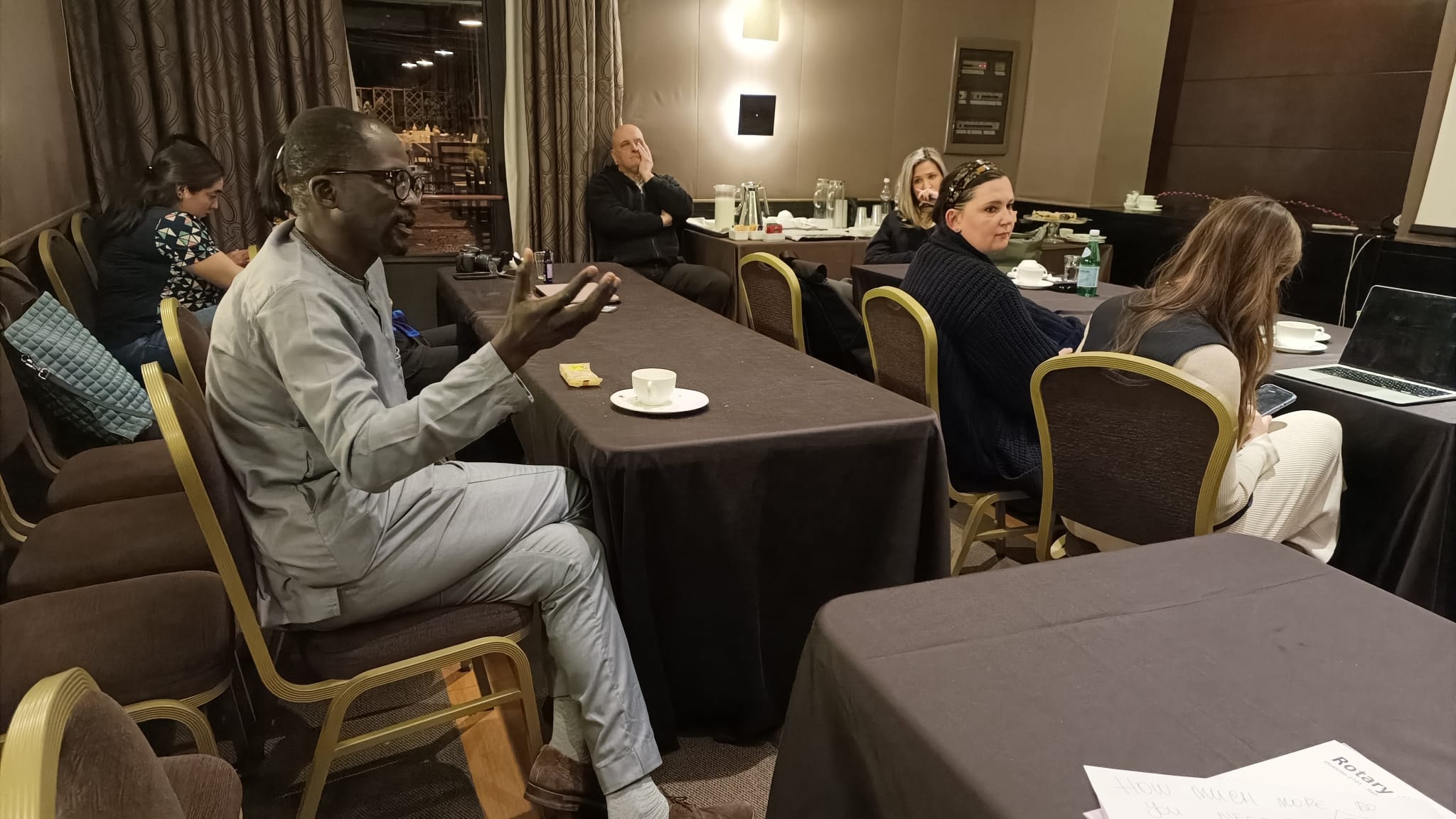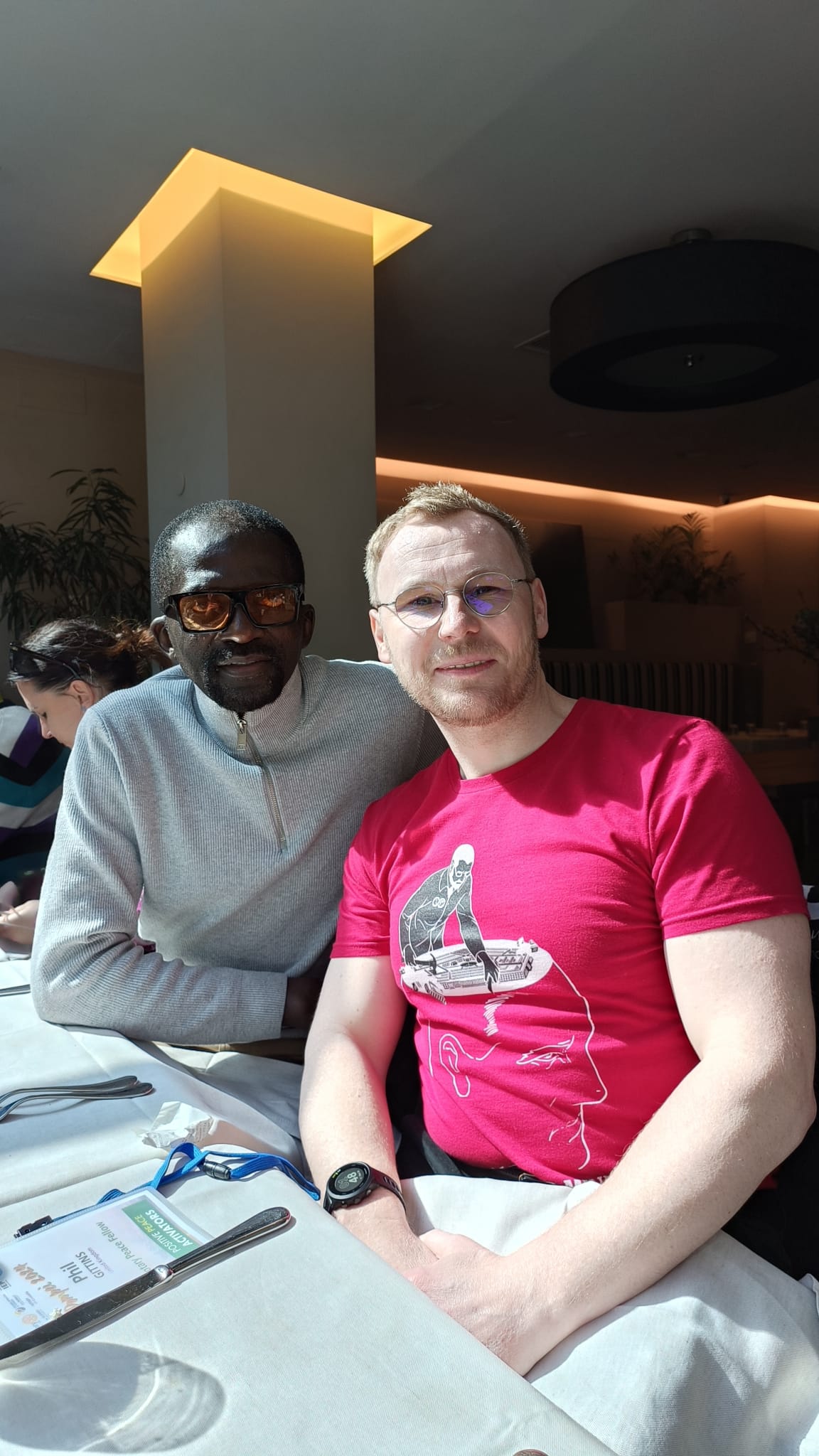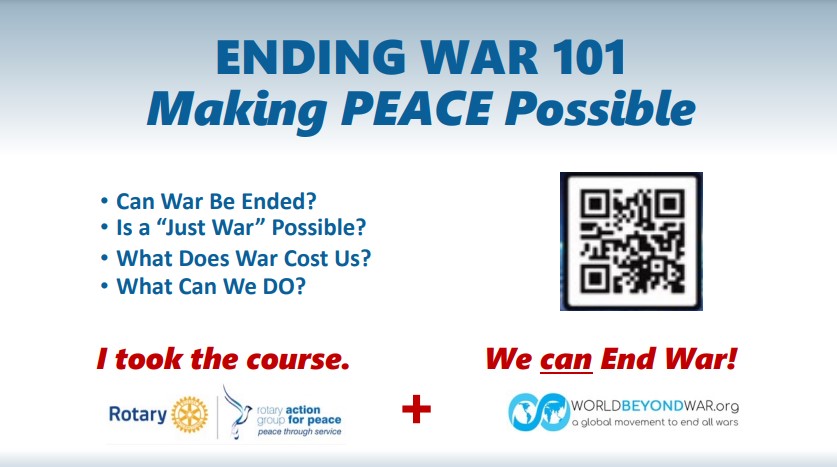By World BEYOND War, March 30, 2024
World BEYOND War’s Education Director, Phill Gittins, joined other peacebuilders from across Europe for the Positive Peace Summit held in Pompei, Italy from March 22nd to 24th. The summit was organised by Rotary International and the Institute for Economics and Peace, in collaboration with local Rotary Clubs and Districts. The summit coincided with another peace event organised by Rotary District 2101, centred around the theme “Peace First.”
Together, these events brought together a diverse group of people from various locations, sectors, and backgrounds. This included representatives from Rotary (such as Rotarians, Rotaract, Rotary Peace Fellows, Positive Peace Activators, Rotary Cadre members, Board Members from the Rotary Action Group For Peace and the Rotary Peace Fellow Alumni Association). It also included people from the Institute for Economics and Peace (IEP), Greenpeace, Red Cross, NATO, veterans, and think tanks. They provided opportunities to explore the different ways in which people make sense of the current circumstances, opportunities for, and challenges to peace at local, regional, and global levels, while simultaneously creating space to reflect on and make a supportive contribution to the collaborative venture between Rotary and IEP.
 |
 |
The diversity of participants was matched by a diversity of viewpoints on what it takes to build peace. The first day featured a variety of speakers discussing the importance of peace and the destruction caused by war, with one claiming that “Everything can be built with peace, everything is lost with war.” Despite much talk about war and despite strong opinions about the need to end wars, there were conflicting viewpoints. Some described war as a “sign of madness”, while others asserted that “war is inevitable”. There was also talk of “military interventions being necessary to keep us safe,” with one going as far as to claim that “we get to peace through war.”
Though all in the summit expressed support for the concept of Positive Peace, discussions were largely framed around how to apply IEP’s eight pillars of the Positive Peace Framework. Some stressed the importance of supporting “Rotary and IEP’s initiatives to promote the framework,” while others took a more critical and open approach, acknowledging the framework as a valuable tool but also suggesting that it is not the only tool available to the Rotary community and the broader peacebuilding community. On this, Phill commented, “Just as there is no one way to conceptualize peace, there should not be one single approach or methodology to operationalise or activate peace. Context matters.”

|
 |
Throughout the three days, Phill engaged in many discussions about peace and war, during which several expressed surprise and scepticism regarding World BEYOND War’s commitment to the abolition of all war and militarism. Phill suggested that while abolishing war is arguably one of the greatest challenges and rewards facing all people, governments, and organisations, it should hold particular relevance for global entities like Rotary. This is not only because Roary is arguably the world’s largest voluntary peacebuilding organisation but also because of Rotary’s esteemed status with other global entities, such as the UN. Rotary holds the highest consultative status granted to a non-governmental organization by the UN’s Economic and Social Council, which oversees various specialized UN agencies. The UN was established with the mission to “Save succeeding generations from the scourge of War.”
Acknowledging Rotary’s strong commitment to promoting peace and its significant global influence in peace-building efforts, it is surprising that military operations are too often perceived as contributors to peace and security rather than obstacles. Moreover, there appears to be little attention paid to equipping those within the Rotary system with opportunities to learn about and get involved in education and action to prevent and end wars. That this is an important topic for Rotary to be involved in can be gleaned from the fact that war is peace and development in reverse: the leading cause of death, injury, and trauma; the leading destroyer of the natural environment; the cause of the risk of nuclear apocalypse; the top cause of the refugee and debt crises; and the main impediment to global cooperation.
The good news is that progress is being made to address this gap. We are partnering with the Rotary Action Group for Peace (RAGP) and others within Rotary to address this through various initiatives, one of which is “Ending War 101.” Guided by the leadership and innovation of various members from the RAGP, this course combines the respective expertise and resources within Rotary and World BEYOND War (WBW), making available, yet adapting, WBW’s award-winning materials and resources to members of the Rotary family, globally.
The premise of the course is simple but too often overlooked. To make the goal of creating and sustaining positive peace a little more achievable, we must encourage Rotary (and the global community more broadly) to understand and confront the attitudes, institutions, and structures that are detrimental to creating and sustaining peaceful societies. This entails addressing violence in all its forms – direct, structural, and cultural – which in turn means confronting war and militarism. Many might find this hard to believe, but it is true. So, there is a need for a more balanced approach to Rotary’s peace strategy, one that balances the current emphasis on positive forms of peace work with education and activism aimed at transforming the root causes of violence and the dominant war system. This way, Rotary could work towards comprehensive peace, which encompasses both negative peace and positive peace.














4 Responses
I don’t know how old the Rotary Club is, but at age ninety I remembe it solely as being a feel good organization for people facing no threats.. Congratulations on the evolution!
Thank you, Deena. Your perspective is not uncommon. Fortunately, we are working with some excellent leaders from the Rotary system dedicated to supporting other members within the Rotary community to broaden their notions and practices of peace and conflict work.
Excellent summary Phill. Yes, Rotary needs a balanced approach to address prevention of war. Yes, we will always have conflicts but we don’t need to solve conflicts with violence on a personal or national level (fighting, civil war to war with other countries.) All wars end with negotiations and treaties. Therefore lets skip the wars and go directly to negotiation. Rotary also is partnered with Mediators Beyond Borders Inc. that are helpful in mediation. A Rotarian, Ernest Thiessen, PhD, has developed a computer program, SmartSettle, based on the work of Nobel Laureate, John Nash, to have conflicting parties enter their weighted desires to the computer that then delivers suggestions that are better than the status quo. Through multiple iterations, with the help of mediators, root causes can be addressed and peace obtained. Women can be very helpful in this. There have been over 100 countries led by women and only three have been involved in wars. Negotiations by women, tend to last much longer as they look at root causes, than men who look at simple imposed solutions.
Yes, indeed Richard,,, totally agree